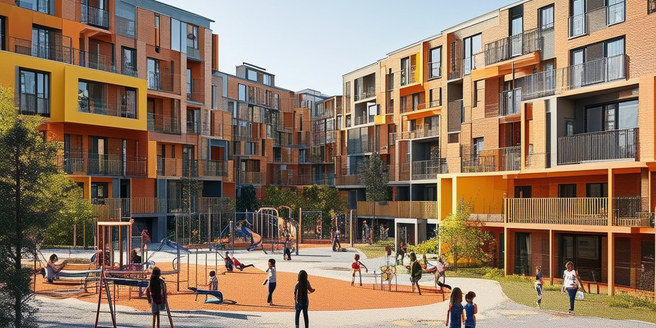Introduction to Affordable Housing Legislation
Affordable housing legislation encompasses laws and policies designed to ensure that housing is affordable for all income levels. By addressing the diverse needs of the population, these regulations help maintain social equity. These laws aim to create a stable housing market, prevent homelessness, and improve overall economic stability. Additionally, affordable housing legislation can help reduce economic disparities and foster a sense of community. By defining what constitutes affordable housing and setting standards for affordability, legislators can establish programs and incentives for the construction and maintenance of affordable units. Key strategies include housing subsidies, tax incentives for developers, and zoning regulations that promote mixed-income communities.
Historical Context of Affordable Housing Laws
The origins of affordable housing legislation in the United States can be traced back to the early 20th century when urbanization led to overcrowded and unsanitary living conditions. The New Deal era of the 1930s saw the introduction of public housing programs aimed at providing low-cost housing solutions. Over the decades, numerous laws have been enacted to address different aspects, such as the Fair Housing Act of 1968, which sought to eliminate housing discrimination. These legislative efforts reflect the ongoing struggle to ensure all citizens have access to safe and affordable homes. Understanding this history is crucial to appreciating the evolution of affordable housing policies.
Key Components of Recent Legislation
Recent legislation on affordable housing often includes several critical components designed to address ongoing issues in the housing market. These components may entail increased federal and state funding for affordable housing projects, zoning reforms to facilitate the construction of multifamily units, and tax incentives for developers willing to invest in low-income housing. Moreover, there is a growing emphasis on incorporating sustainable building practices to ensure long-term cost efficiency and environmental friendliness. Additionally, many new laws focus on preserving existing affordable housing stock through renovation grants and subsidies. These elements work collectively to ensure both the creation of new affordable housing and the preservation of existing units.
Federal vs. State Housing Policies
Federal and state governments play distinct yet complementary roles in affordable housing policy. Federal policies, often implemented through HUD (Department of Housing and Urban Development), provide overarching guidelines and significant funding for state programs. On the other hand, state governments tailor these policies to meet local needs and conditions, which can vary significantly. For instance, inclusionary zoning laws and rent control measures are typically state-level initiatives. The complexity of housing challenges in different regions necessitates adaptable and varied responses. Collaborative efforts between federal and state entities aim to maximize the effectiveness of housing policies and ensure they meet diverse regional requirements.
Impact and Effectiveness of Existing Laws
Evaluating the impact and effectiveness of current affordable housing laws involves analyzing various metrics, such as the number of new affordable units built, the reduction in homelessness rates, and improved housing conditions in low-income areas. Studies often show mixed results, with some programs successfully increasing the availability of affordable housing, while others fall short due to insufficient funding or poor implementation. Local government initiatives and community involvement play crucial roles in addressing these challenges. The effectiveness of these laws is also influenced by economic factors and population growth trends, making ongoing assessment and adjustment vital for long-term success.
Future Trends in Affordable Housing Legislation
Future trends in affordable housing legislation are likely to focus on innovative solutions to longstanding issues. This includes increased use of technology and data analytics to plan and execute housing projects more efficiently and the incorporation of sustainable practices to ensure environmental friendliness. Policymakers are also exploring new funding mechanisms, such as social impact bonds and public-private partnerships, to finance affordable housing developments. Furthermore, the role of community engagement in shaping these housing projects is becoming increasingly recognized. Additionally, there is a growing emphasis on integrating affordable housing with community services, such as healthcare and education, to create holistic support systems for residents.



